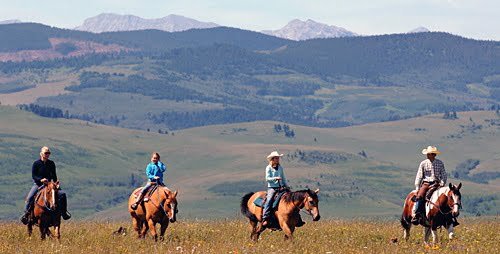The idea of working on a ranch and living the cowboy life has become romanticised by many people looking for a simpler life surrounded by nature.
For others, this type of life seems impossibly difficult. Although definitely not impossible, it is taxing work and is more than riding a horse off into the sunset. Still, working on a farm or ranch can be immensely rewarding and has a multitude of benefits.

Ranches and farms are not the same, a farm focusing on agriculture with plots of cultivated land while ranches are generally geared towards raising cattle and livestock. The tasks on a farm can therefore be different from those on a ranch.
Either way, you can expect mostly physical work, from horseback riding and animal care to irrigation and gardening. You will gain a wide range of skills and will have the opportunity to experience a different way of life than what you may be used to.

As climate change continues to affect our view of the environment, more people are looking for ways to connect with nature. The world also continues to digitise and many feel called to a simpler life with more freedom and real gratifying work to be done. Particularly after the pandemic, the desire to breathe fresh air in wide open spaces and explore a different lifestyle was felt by many. The way of farming itself is also becoming more modernised allowing for more opportunities for growth in the field.
There are opportunities to work on a farm or ranch all over the world.
Australia and New Zealand are very popular destinations with hundreds of millions of acres of agricultural land. With their fair minimum wages, you can also rest assured that you will not go broke while travelling.
Canada and the US are also well known for their thriving farming industries. There is a very high demand for farm and ranch workers, making finding a job an achievable task. Within the US, the state with the most farms is Texas, followed by Missouri and Iowa.
France is home to many vineyards which need volunteers and interns as well. Italy and Spain face the same predicament. It is hard work to maintain the upkeep of the vineyards, pick the grapes, etc. but it is also rewarding work in a gorgeous setting. You can learn more about the winemaking process while working too!
Recently, farms in the UK have been incentivising young people to come and work, particularly as fruit pickers. Due to Brexit and the pandemic, there has been a shortage of fruit pickers and farm workers, leading to initiatives tempting people to come and fill those roles.
There are many roles that need to be filled on a ranch, from cowboys and wranglers to accountants and mechanics. However, typically working on a ranch is manual, outdoor work. It will differ depending on the type of ranch you are working on though will most likely entail maintaining the property, helping to raise cow-calfs, cleaning up after and feeding animals, etc.
You may be worried and wondering if you can work on a ranch with no experience. The answer is yes, though it is not easy and you should be prepared for long days.
You may be required to work in all sorts of weather conditions, something to think about when choosing the time of year you go. You will spend most of your day outdoors, probably getting dirty and often with few scheduled breaks. You don’t necessarily need any special skills, experience or expertise, though some activities may require you to have prior experience.
It is far more important to be able to follow directions, be ‘teachable,’ be good with your hands and, mostly importantly, to have a good attitude.
Farm work is quite similar to ranch work, though there are a few notable differences. Working on a farm, you can expect your work to fall into one of four categories:
managing the land, growing/harvesting crops, tending to livestock and maintenance/repair.
In addition, the activities needed to be done on a farm, perhaps more so than on a ranch, depend largely on the time of year. Regardless of whether you are dealing with animals, equipment or agriculture, you can expect tiring, outdoor work that will leave you feeling fulfilled by the end of the day.
Working on a farm requires a variety of skills to be successful, most of which are soft skills such as problem solving, interpersonal skills and organisational skills. Nevertheless, there are also some concrete skills that are necessary, though many can be taught and learned on the farm. You will need to learn the mechanics of farm equipment and the art of repair.
Staying up to date on advances in farming technologies is important as well. The day-to-day activities and the complexities of farm operations will also be necessary to learn. Being in good health with physical stamina is crucial if you wish to be successful in a farm job as the work is primarily physical labour.
There are many ways in which to begin working on a ranch. You could work on a ranch for a summer, allowing you to travel and earn money without interrupting your studies. Alternatively, you could choose to do a longer ranch internship by taking a gap year.
There are many opportunities for ranch gap years, Australia, for example, having a system in place in which you are eligible for a second working visa if you first complete 88 days working in several specific fields, one of which being a farm/ranch in the country.
Another popular place for a ranch gap year is Canada. Working on a ranch in Canada is perfect for those who are called to the great outdoors, wide open spaces and rewarding, hands-on work. After a month of English classes, you will be placed with a host family and join them in their daily tasks. Depending on the type of farm/ranch they have, the activities you do will differ. You may find yourself on a horse farm, guest ranch, cattle farm, winery, alpaca farm, etc. You are able to request a specific type of operation if you so choose as well.
Not only will you learn new skills related to the work you do, but you will also get to experience Canadian culture firsthand! You will join the family in all their activities from the farm work itself to neighbourhood visits, festivals and rodeos. Working on a ranch in Canada will give you freedom, increased autonomy and responsibility, new skills and memories to last a lifetime!
Farm work is mainly manual labour, much of which is outdoors, meaning that the time of year you go will impact the tasks given to you. This is particularly true of agricultural farms where the activities depend largely on the crops and their harvest. Going on a farm gap year allows you the time to see and experience more of farm life, rather than the glimpse that a summer working on a farm would give you.
There are many gap year programs for those wishing to work on a farm and this can be a very beneficial way to spend your time off from working or studying.
New Zealand is another place with many farm work opportunities. A farm experience in New Zealand will teach you how a farm works, immerse you in the culture and increase your autonomy and responsibility. You can work on a farm with no experience and will certainly learn a lot. However, depending on the host family you stay and work with, your tasks may be slightly different and you may not be able to stay beyond 12 weeks. Nevertheless, regardless of how much expertise you have in the field, it will certainly be a rewarding experience.
In New Zealand, you will begin with a month of English lessons before being placed on a farm. You could find yourself on a dairy farm, cattle farm, horse farm, mixed farm or guest ranch, depending on availability. The work is primarily agricultural though, as you are staying with them, you will also be asked to help out with other family tasks. This will fully integrate you into the culture of New Zealand!
Although not easy, ranch life has a multitude of benefits.
Working on a farm can also be extremely beneficial.
Yes! Working on a ranch can certainly be difficult but as long as you are open to learning, you can definitely succeed. Some tasks are not possible without experience, such as some horse wrangling. There are plenty of activities that you don't need any experience for though and as long as you put the work in, you will certainly learn some new skills.
Yes! Working on a farm is no easy feat, but having a good attitude is just as, if not more, important as any experience or expertise. Be willing to learn, work hard and enjoy the little moments and you will definitely look back and smile on the experience for the rest of your life.
Living and working on a farm will depend what type of farm you are on, however, some aspects of life are constant between most farms. You will be working on-site, usually in a rural area, and will most likely have long, regular hours. Days on the farm start early so you will definitely learn to be an early riser. Most of the work is outdoors working with machinery, animals and the land. The individual tasks themselves are what differ between farms.
A gap year is the perfect time to work on a ranch as this is time set aside to grow personally, professionally and to see the world, all of which you can do with a ranch gap year. This opportunity allows you to try something new, gain new skills and travel on a budget.
No data was found What is farm/ranch work and where are there opportunities?
Opportunities to work on a ranch
Opportunities to work on a farm
Why work on a ranch?
Why work on a farm?
So what are you waiting for? Go work on a farm/ranch, learn new skills and have the experience of a lifetime!
Did you like this article ?
Share it on social media!
In this article :
Similar items
Our latest articles


